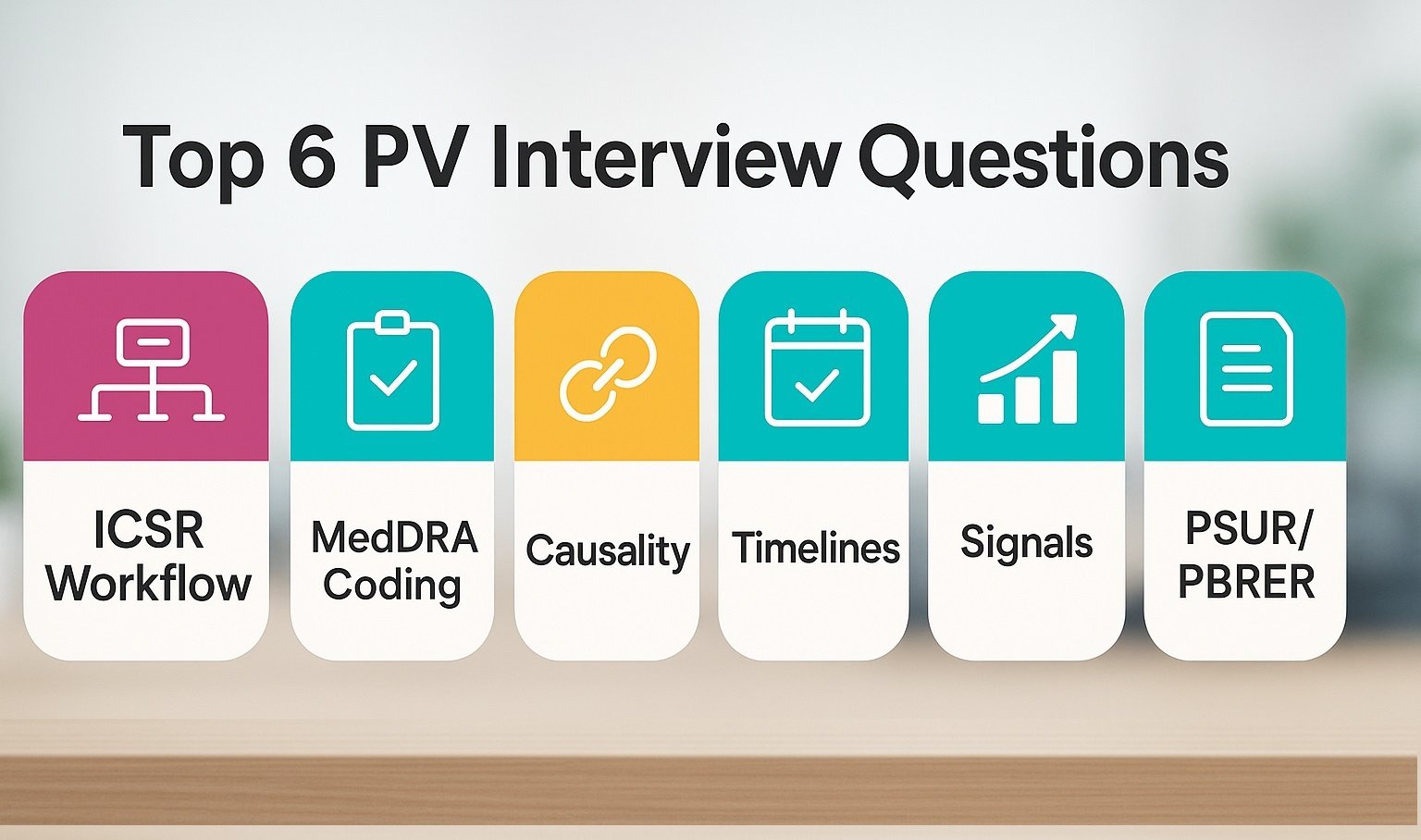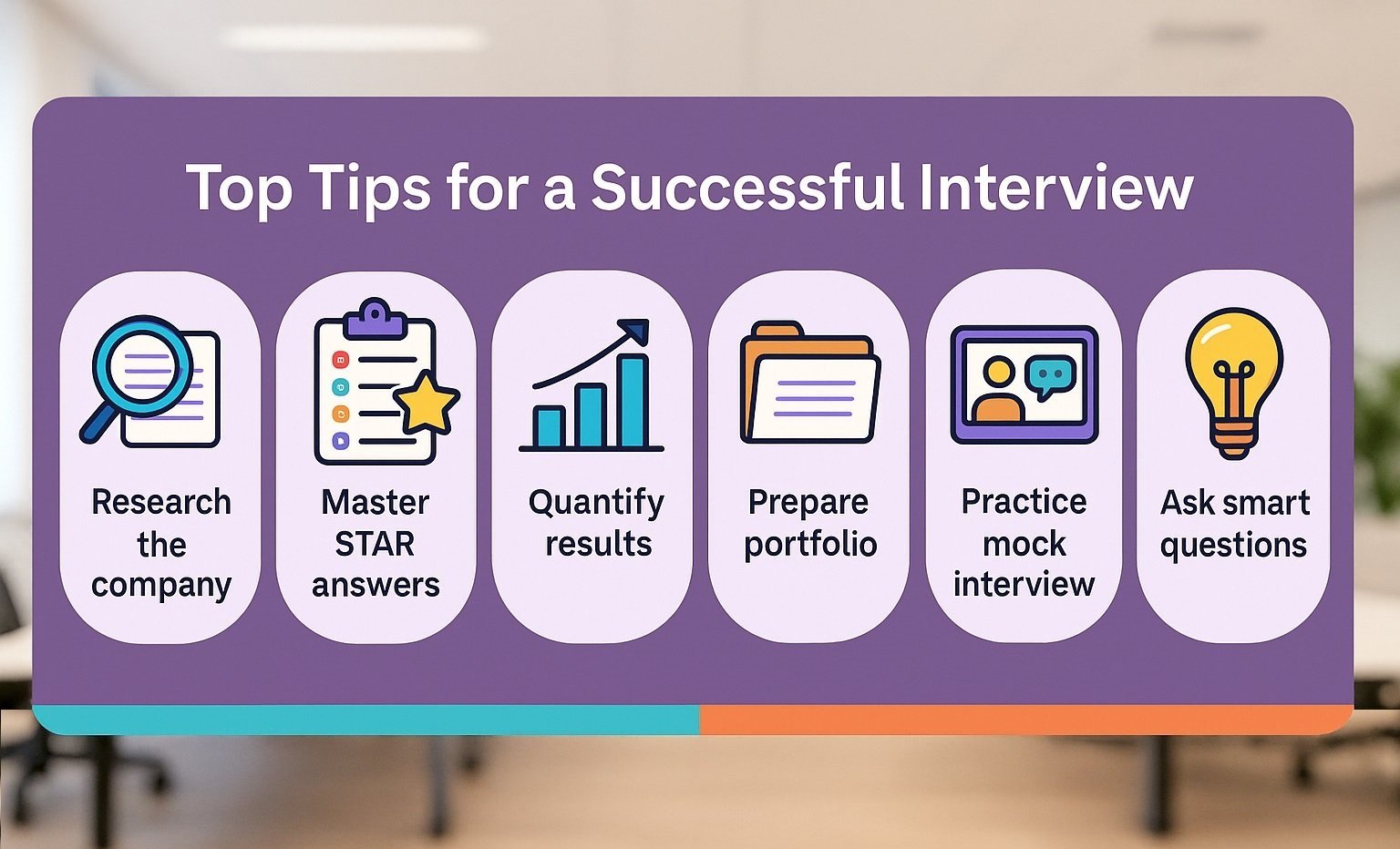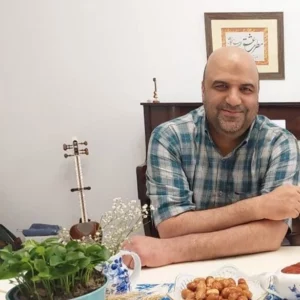Rising demand across Pharma Jobs makes mastering pharmacovigilance interview questions essential. The PV market is projected to reach $11.36B by 2030 (~6.5% CAGR), signaling more roles and tougher hiring standards (Grand View Research. In the U.S., Pharmacovigilance Specialists earn about $121k/year on average, reflecting strong pay and career traction (Glassdoor).
Use this guide to sharpen ICSR processing, MedDRA coding, and GVP/ICH fundamentals so you stand out.
Table of Contents
Common Pharmacovigilance Interview Questions with Answers
Pharmacovigilance interviews often probe judgment and compliance readiness. Expect questions on ICSR handling, MedDRA coding, causality methods, signal escalation, and documentation quality. Employers test how you think under pressure. They also value clarity and timelines. Below, we group common questions and answers into three practical categories.
- General / HR PV Interview Questions
- Technical PV Interview Questions
- Scenario-Based PV Interview Questions
General / HR PV Interview Questions
Before technical drills, PV interviews start with general questions to assess fit, motivation, and communication. Keep answers structured, concise, and tied to patient safety, compliance, and teamwork.
Q: Tell me about yourself.
A: Clinical pharmacy graduate with PV internship. I handled ICSRs, coded MedDRA, and wrote narratives. I value data, teamwork, and timelines, and aim to improve safety outcomes.
Q: Why pharmacovigilance?
A: Because PV protects patients and uses my analytical strengths. I enjoy causality assessment, trend detection, and communication. Change demands continuous learning, energizing me to maintain compliance.
Q: Your strengths and weaknesses?
A: Strengths: structured thinking, ALCOA+ documentation, and stakeholder communication. Weakness: over-detailing narratives. I mitigate by timeboxing, using checklists, and seeking early feedback to balance precision with speed.
Q: How do you handle tight timelines and pressure?
A: I prioritize by risk and due date, break tasks into blocks, and communicate early. I track timelines with dashboards, request clarifications, and escalate before deadlines slip.

Technical PV Interview Questions
Here’s a concise, interview-ready set of technical PV Q&As covering case processing, MedDRA coding, signal detection, and PSURs/PBRER.
Walk me through ICSR processing.
Intake → triage → duplicate check → MedDRA coding → seriousness/expectedness/causality → narrative → follow-up plan → QC → regulatory submission (E2B(R3)) → closure with audit trail.
How do you assess seriousness and expectedness?
Apply ICH E2A seriousness criteria. Check expectedness against RSI/label (SmPC/USPI). Document rationale and impact on reporting timelines and aggregate commitments.
Explain your causality approach.
Use WHO-UMC or Naranjo. Evaluate temporality, dechallenge/rechallenge, biological plausibility, alternative causes, and dose-response. Record reasoning transparently in the case narrative.
How do you code with MedDRA?
Code to the most accurate LLT reflecting verbatim meaning. Confirm hierarchy to PT/SOC. Manage version control, recoding rules, and justify any clinical coding decisions.
When would you use SMQs?
For case finding and evaluation. Start narrow for specificity, broaden if needed. Review false positives, clinical context, and signal impact on risk profile.
Scenario-Based PV Interview Questions
Scenario 1 — Blinded trial SUSAR
Short description: Life-threatening anaphylaxis hours post-dose in a blinded Phase III trial; likely SUSAR requiring rapid unblinding control and 7-day reporting.
Model answer: Secure patient safety; alert PI/medical monitor; confirm minimum criteria; check RSI; assess causality; start 7-day clock; request controlled unblinding; code MedDRA; write ALCOA+ narrative; submit E2B(R3); notify IRB/IEC; set targeted follow-ups; keep full audit trail.
Scenario 2 — Late case with duplicate risk
Short description: Serious unexpected case due tomorrow; outcome unknown; two sources may describe the same patient/event.
Model answer: Submit expedited initial with minimum criteria and note gaps; investigate and merge duplicates per SOP; prioritize follow-ups (diagnosis, outcome, labs, exposure); update timelines; escalate early if risk persists; record deviation; implement CAPA to prevent recurrence.

Tips to Succeed in a Pharmacovigilance Interview
Pharma Career Coaching for pharmacovigilance interview questions—get 1:1 prep that’s fast, practical, and inspection-ready. We drill real ICSR cases, tighten your narratives, and sharpen answers hiring managers expect. Book your session:
DS Associate, Safety Scientist, or QPPV scenarios with scored feedback.
Intake → closure: triage, duplicates, MedDRA, narrative, timelines, QC.
Choose precise LLTs/PTs, manage versioning, explain rationale clearly.
Apply WHO-UMC/Naranjo and ICH criteria under time pressure.
SMQs, trend review, benefit-risk messaging, and PSUR/PBRER essentials.
Turn projects into concise, quantified wins.
Pharmacovigilance Terms to Know in Job Interview
AE (Adverse Event): Any untoward medical occurrence after product use, not necessarily caused by it.
SAE (Serious Adverse Event): AE causing death, life-threat, hospitalization, disability, congenital anomaly, or other significant medical event.
ADR (Adverse Drug Reaction): AE with a suspected causal link to the product.
ICSR (Individual Case Safety Report): A single patient safety report submitted to regulators.
Minimum Criteria: Identifiable patient, reporter, suspect product, and event—starts the reporting clock.
CIOMS: Council standardizing safety report forms (e.g., CIOMS I).
E2B(R3): ICH electronic ICSR transmission standard (XML).
SUSAR: Serious, unexpected, suspected adverse reaction; requires expedited reporting.
GVP: EU Good Pharmacovigilance Practices guideline series.
ICH: International Council for Harmonisation; sets PV/clinical standards.
Final words
Pharma Jobs are growing, so mastering pharmacovigilance interview question matters more than ever. U.S. medical scientists—often the PV talent pool—are projected to grow 9% from 2024–2034. Meanwhile, EudraVigilance logged over 1.9 million ADR reports in 2023, underscoring sustained safety workloads.
This guide covered HR, technical, and scenario questions, plus ICSR, MedDRA, GVP/ICH, and a mini glossary.
FAQs:
1️⃣ What do PV interviewers look for?
Sound judgment under pressure, compliance mindset, and clear communication. Prove ICSR fluency, MedDRA accuracy, GVP/ICH awareness, ALCOA+ documentation, timeline discipline, and teamwork with medical, QA, and data functions.
2️⃣ How should I prepare quickly?
Rehearse an end-to-end ICSR walk, refresh GVP/ICH basics, and practice causality/expectedness. Build STAR stories, bring a mini portfolio (two anonymized narratives + a case log), and run a timed mock interview.
3️⃣ How do I structure strong answers?
Use STAR: Situation, Task, Action, Result. State your decision, the guideline behind it, and the impact (errors reduced, timelines met). Keep it concise, patient-safety first, and inspection-ready.
Refrences

Ershad Moradi, a Content Marketing Specialist at Zamann Pharma Support, brings 6 years of experience in the pharmaceutical industry. Specializing in pharmaceutical and medical technologies, Ershad is currently focused on expanding his knowledge in marketing and improving communication in the field. Outside of work, Ershad enjoys reading and attending industry related networks to stay up-to-date on the latest advancements. With a passion for continuous learning and growth, Ershad is always looking for new opportunities to enhance his skills and contribute to pharmaceutical industry. Connect with Ershad on Facebook for more information.

Top Pharmacovigilance Interview Questions and Expert Answers (2025 Guide)
Interviewing for a pharmacovigilance role in 2025? This guide breaks down the most asked pharmacovigilance interview questions—HR, technical, and scenario-based—with expert, inspection-ready answers. Master ICSR walkthroughs, MedDRA coding, causality, and timelines. Plus: a mini glossary and fast prep tips to help you stand out.

Best R&D Pharma Jobs & Career Opportunities in 2025
Explore the best R&D pharma jobs and career opportunities in 2025. Learn what qualifications employers seek, how to apply effectively, and how to use Pharmuni’s job search tools to find rewarding research and development roles in the global pharmaceutical industry.

GMP Jobs in Pharma: Roles, Skills, and How to Start Your Career
Searching for GMP jobs? This guide explains core roles, required qualifications, and certificates. Learn QA, QC, Validation, Regulatory, and Auditor paths. See salary trends and growth.


